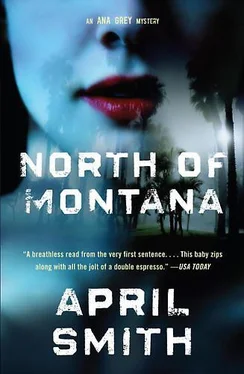I drop some change into the dish.
“Isn’t that a funny place for a shrine?”
“A shrine can be anywhere. A lot of Spanish people make shrines in the place where someone has died, like in Baja, you see them along the road where people have been killed in car accidents.” She moves the lollypop tree back in place. “We keep ours here so people won’t steal from El Niño.”
Some saint, I think, following Mrs. Gutiérrez outside.
The children have trailed the sounds of the rooster to a tiny pet store crammed with aquariums and rank with the smell of tropical fish in stagnant water. Two roosters blink suspiciously from cages on the floor.
“Are those fighting cocks?” I ask the man.
He nods. Cock fighting is illegal, but the hell with it. The children are fascinated by a pair of parakeets. Although Mrs. Gutiérrez is keeping her back to me, I lay a hand on her shoulder.
“I want to know the truth about my cousin.”
The two of us step outside where the long hot afternoon sun smacks our faces with a direct hit. Mrs. Gutiérrez pats her white vinyl pocketbook several times. She is still seething.
“Your cousin was fired because she saw Mrs. Claire with a man who was not her husband.”
“When was this?”
“Violeta came back from a walk with the baby and a man was with Mrs. Claire inside the door.”
I remember Warren Speca telling me that he saw Violeta one time when he went over to Claire’s near the end of their affair. This must have been the time.
Mrs. Gutiérrez waves a hand in disgust. “They were doing bad things.”
I can see Warren Speca surprising Claire, emboldened by the fantasy that she will leave her marriage, pushing her up against the wall of her husband’s house and trying to make love right there, standing up, underneath the crystal chandelier.
Violeta came in. They were surprised but they no care. The man leave right away. Violeta is very angry. She is a religious person—”
Mrs. Gutierrez’s voice breaks. She wipes her eyes.
“ ‘You have a husband,’ she tells Mrs. Claire. ‘You sin against God.’ ”
The pocketbook opens and the pound-size roll of tissues comes out.
“Violeta says, ‘I love your children like they are mine. I leave my own children to work for you. I no lie to you but you lie to me. You are sleeping around like a whore!’ Mrs. Claire fires her on the spot.”
“She was afraid Violeta would tell her husband about the affair.”
“Yes.” Mrs. Gutiérrez blows her nose savagely. Her manner turns cold. She is going to tell me the facts of life:
“Mrs. Claire spreads this terrible lie that it was Violeta’s fault the little girl almost drowned. Violeta cannot get a job. She does not have a reference. She cannot pay the rent. Teresa has a bad ear infection and the clinic takes only cash. Violeta is terrified that she and the children will end up on the street or in a church basement with the homeless, or maybe the welfare people will take the children away. After many weeks she finds work at night, washing the laundry in a big health club in West L. A. Her children sleep in my apartment until she comes home at six in the morning. Only one night, she doesn’t come home.”
The crime scene photos tell the story. Violeta gets off the bus on a destitute corner before dawn, trudging past hustlers and dealers. By now the route is habitual. She’s almost home, she’s tired, her guard fails.
“This is why I say it was the fault of Mrs. Claire.”
I remember Claire Eberhardt’s overwhelming guilt the very first time I met her at the front door. She was acting like a suspect with something to hide: an illicit affair. A desperate cover-up that ended in ruin.
“Here also is the truth: the girl did fall into the pool, but it was Violeta who saved her life.”
My eyebrows raise in skepticism but Mrs. Gutiérrez nods many times.
A youngish man with dyed auburn hair walks up to us and unlocks the rusted gates.
Mrs. Gutiérrez makes a small deferential bow, as if to a priest. “Buenos días, Don Roberto. ”
He returns the formal greeting, pushes the gate open, and continues inside.
Mrs. Gutiérrez speaks with breathless urgency: “The only person who knows what is best for the children is the mother. The government of the United States will not decide. Don Roberto will ask the spirit of Violeta. She alone will tell us what to do.”
Hispanic workers are getting off buses, sending curious glances my way as they stop into Tienda Alma on their way home. Mrs. Gutiérrez has gathered the children. With a last look at the busy street bathed in setting sun, I follow the clap-clap of her heels into the darkened botánica .
• • •
Mrs. Gutiérrez, Roberto, and I sit in the back of the shop at a card table upon which is a small radio and a white candle. I wonder if we will hear Violeta’s voice through the speaker. Roberto is about twenty-five years old, a homosexual with a dark complexion, a hip haircut that is partially shaved at the neck and longer on top, and a gold hoop earring. He wears a silky tan shirt and brown pants, but something is out of whack. The body is out of proportion — arms too long for a stunted torso — and he has trouble speaking. One side of the mouth seems to be paralyzed and as he struggles to explain how he got his gift, fingers rub the forehead with frustration:
“My father and grandfather did this in our village. A hundred people would stand in line at the door. I learned from the age of seven.”
When it comes to spiritual advice the deal is simple: “You tell me the truth and I tell you the truth.”
He lights the candle.
Despite the battle-scarred exterior, the place has clean floors and a certain order, and smells pleasantly of lavender incense. Behind old-fashioned wooden counters are shelves filled with small square half-ounce bottles of red, blue, and green oils. Floor-to-ceiling cases are filled with eight-inch glass candles, each with a picture of a saint and a promise of luck or salvation or protection.
From the ceiling hang ropes of colored beads. Near the door are packets of herbs and spices, a model made of plaster of paris of a Native American chief, and an aloe plant, colored ribbons tied in bows on its spiky leaves. A display holds rosaries, statues of cows, pendants with single eyeballs looking out of black triangles, greasy little booklets about “Red Magic” and “Green Magic,” and on a revolving rack there are plastic pictures of all the saints, numbered for easy selection.
We have left Teresa and Cristóbal with the Indian chief and staring eyeballs to sit at the card table behind a partition. Behind us is a multilevel altar upon which have been placed glasses of water, candles, pots of chrysanthemums, and a dish holding three small eggs covered with colored confetti.
A lot of the reading takes place in Spanish with a few sidebars in English. Mrs. Gutiérrez talks about the situation of Violeta’s children. Don Roberto listens and asks her to write out her name and her mother’s maiden name on a pad. He counts up the letters in the names then deals that number of Tarot cards.
“Please think about the mother of these children, Violeta Alvarado.”
She obediently closes her eyes. I stare at the radio and conjure up the photo of the parrot. Then the feeling comes to me of holding Violeta’s small leather Bible in my hands; the dryness of it, like the poignant tiny body of a hummingbird I once found on my balcony.
Mrs. Gutiérrez is warned not to cross her legs or lean on the table as that would affect “the energy.” She must turn over two cards, right to left. The first is El Sol , The Sun.
“This card means El Salvador,” says Don Roberto.
Читать дальше












